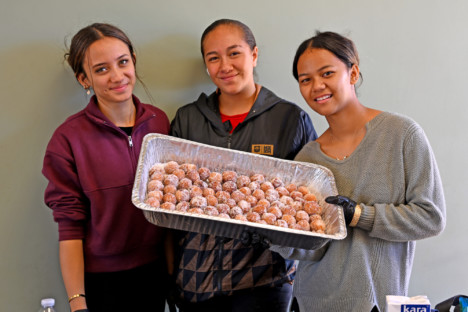Food Summit Celebrates Youth in Agriculture
By Léo Azambuja
The Molokai Youth Food Summit underscored the importance of getting the youth interested in agriculture. At least 85% of Hawaii’s food is imported, so a key aspect of lessening Molokai’s food dependency on the mainland in the future could be in the youth’s hands.
“Youth is important in agriculture, because they’re going to be our future. We’re going to be standing up and we’re going to be doing what’s right for the world,” Molokai High School student Francis Leo Bumatay said. “If we don’t start now, or if we don’t care about the plants or the ground that we have, what do we have after that?”
The event at Lanikeha Community Center Saturday morning was the first youth summit on Molokai. Event organizer Kilia Purdy, of the Molokai Homestead Youth Council, said she hopes to make it an annual event.
The event celebrated youth in food systems. It aimed to empower them to engage in their cultural heritage, integrate traditional and modern food and farming practices, and advocate for sustainable and equitable food systems, according to organizers.
Unlike most food summits organized throughout Hawaii, Purdy said, this one was “really focused on our youth.” The adults were just volunteers helping behind the scenes, she said.
“It’s really the youth who are the ones demonstrating, putting on the activities and all of that stuff,” Purdy said.
There were youth speakers, food and farm demos, resource booths and giveaways.
Bumatay was one of the students assigned to keep the event running. He was onstage emceeing the event and giving away prizes.
“I feel like everyone here is working together in such an amazing way, and I wish I could do this again,” he said.
A group of Molokai High School students brought food products made with coconut, highlighting the importance of this food source. They had malasadas, pani popo and curry, all of them made with coconut.
“Our project is dedicated to the coconut, to spread awareness,” MHS student Jacey Gamit said, explaining the coconut rhinoceros beetle is a highly invasive species that destroys coconut trees. The beetle has not been detected on Molokai, but it is on all other Main Hawaiian Islands.
After the event ended at 2 p.m., Daniel Anthony of the Oahu-based nonprofit organization Aloha Organic presented a workshop on how to deal with the coconut rhinoceros beetle.
MHS teacher Kelly Rawlins was there with the kids from the school’s Future Farmers of America group. They were selling a generous huli huli chicken plate lunch to raise funds for the state FFA convention in Kona.
“They raised the chicken, they processed the chicken, they cooked the chicken. They did everything from start to finish, basically farm to table,” Purdy said.
Rawlins said the school’s FFA program is doing “very well.” They currently have 58 egg layers, 40 ducks and two goats. Additionally, they are about to get 25 meat birds, she said. The program also has a farm where they grow taro, chili pepper and coconut.
Purdy said there were three main purposes to organize the first Molokai Youth Food Summit.
The first reason was because after attending other food summit events on Oahu and Maui, she realized that despite the Molokai kids having participated as panelists in those events, they were mostly run by adults for adults.
“You’re lucky if you had a handful of students there at these conferences, and yet, a lot of them kind of speak on the future, what they’re doing for the future. And for me, if we’re speaking of the future, we need to have a better presence of our youth there,” Purdy said.
After they attended a youth-focused event on Oahu, the Molokai kids asked for a similar summit on the island.
“Fast forward two years later; I tried for the grant, received the grant, and here we are doing this event for the youth. This is what they asked for,” Purdy said.
Another reason, she said, was to showcase and celebrate Molokai’s youth in food systems, so they feel important for their hard work and they know people recognize them for what they are doing.
The last reason was to bring more youth into agriculture, she said.
“ʻĀina momona was one of our nicknames. So, ʻāina momona means abundant land, because at one point in time, we were known to have an abundance of food, so much that we could feed ourselves and the outer islands,” Purdy said. “But today, you don’t see that. We’re so dependent on the barge.”
Hoʻolehua Homestead is the largest Hawaiian homestead land on Molokai. Purdy said they have the resources; they just need to train the next generation to grow more food, so when things like the COVID pandemic happen, or when the barges cannot come, there is food here already. Despite there being a lot of hunting, fishing and farming on Molokai, she said, the island is still dependent on the barge to bring food.
“We have to try to shift that, and I think as a collective, we can,” Purdy said.
The Molokai Youth Food Summit was organized by the Molokai Homestead Youth Council, in partnership with Hui Mea ʻAi, Molokai Future Farms of America and the Molokai High School Youth Entrepreneurs.












Don't have a Molokai Dispatch ID?
Sign up is easy. Sign up now
You must login to post a comment.
Lost Password